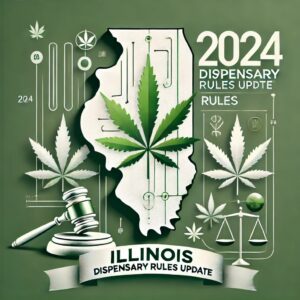
What Does a Cannabis Lawyer Do? Explained
What Does a Cannabis Lawyer Do? Explained The cannabis industry is evolving growing. Large law firms are now adding cannabis industry practice groups to their

Illinois Dispensary Rules: Key Updates for 2024
As the Illinois cannabis market continues to evolve, so too does the regulatory landscape. In August 2024, the Illinois Dispensary Rules changed when the Department

Intoxicating Hemp-Derived Cannabinoids Illegal
Intoxicating Hemp-Derived Cannabinoids: Legality of HHC, THCp, Delta-8 Understanding the complex world of hemp-derived cannabinoids can feel like solving a jigsaw puzzle with pieces that

What is a Corporate Formation Lawyer? A Comprehensive Guide to Their Role
A corporate formation lawyer plays a pivotal role in helping entrepreneurs, startups, and established businesses navigate the complex legal landscape of forming and structuring a

Second Amendment and Marijuana Use | Case of US v. Connelly 2024
Fifth Circuit Court Ruling on Second Amendment and Marijuana Use: A Landmark Case The Fifth Circuit Court of Appeals recently handed down a significant decision

Delaware Adult Use Cannabis License Application: A Comprehensive Guide
Understanding the Delaware Marijuana Control Act The Delaware Marijuana Control Act is the legal backbone for regulating adult use cannabis in the state. It will

Cannabis Leases: Key Considerations for Landlords
Cannabis Leases: How to Secure the Best Deal The retail cannabis market in the United States is expanding like never before. You have a chance

15-36 License Application: A Step-by-Step Guide
15-36 License Application: A Step-by-Step Guide Navigating the 15-36 license application process is difficult for the winning social equity conditional dispensing organization in Illinois. The

Congress Appropriations and Cannabis Legalization Update
Congress is directing significant attention to cannabis legalization through its appropriations process. What does this mean for you? Dive into the latest updates on


